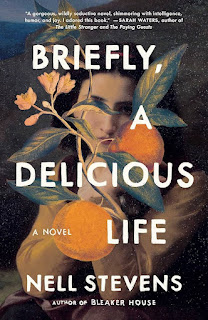Science Fiction Annotation - This Is How You Lose the Time War
Genre: Science Fiction
Publication Date: July 16, 2019
Number of Pages: 208
Geographical Setting: All around the world and beyond
Time Period: All of ‘em
Series: N/A
Plot Summary:
Subject Headings:
Science Fiction, Fantasy, Time Travel
Science Fiction Appeal:
Characterization:
Despite being far from human, Red and Blue feel unidentifiable real. They are charming and witty, both with heartbreaking histories and futures. Overall, I think Time War is a science fiction book that can so easily usher in readers of literary fiction and even romance, those who tend to stray from serious time-travel and jargon-heavy science. This is a star-crossed lovers tale of pawns on opposing sides. The details are enough to snag true science-fiction lovers, while those not so familiar with the genre will be brought in by the personalities.
Tone:
This Is How You Lose the Time War is not a book that is afraid to make a joke. Red and Blue offer and endless back-and-forth banter that lightens the overall tone of the book. Their letters make you smile, their inevitable love make you hope for their better future, and the war in the background makes you question the chances of that. It’s a book about war and what you’d risk in it, with enough lightheartedness that only makes you ache more for the characters.
Frame/Setting:
The setting of Time War is impossible to pin down. The characters travel from versions of semi-successful Atlantis to first-century Beijing to a fight among starfleets in the distant future. And still, in the background and only ever creeping into the spotlight, is the talk of their homes - of Red’s Agency and Blue’s Garden. Like the characters, their homes are largely left to our own interpretation. The Agency and it’s inhabitants feel more technological - I had envisioned a metallic landscape filled with robocops - while the Garden is, as the name suggests, greener. It’s a more natural landscape, albeit one in which the inhabitants are planted in the ground. As a story that takes place within the strands of time, Time War’s setting is not a simple one.
Language/style:
Time War is itself a mix of genres, and the language of the story only adds to that. Parts of the book require the reader to read them twice - at least, slowly - to parse, word-by-word, both the jargon-heavy details of the setting and the poetic descriptions. It’s a book that favors a slow-read, and the short page-count does not equate a short read-time.
3 Terms to Describe this Book:
Time-travel, Queer fiction, Challenging
3 Fiction Recommendations
David Mitchell’s Cloud Atlas is a great bet if you loved Time War’s time-traveling, as well as prose-like style.
Our Wives Under the Sea by Julia Armfield offers another another sapphic fantasy work that focuses on love, otherness, and grief.
R. F. Kuang’s Babel is a good one to check out if you want more something that also focuses on questioning the unjust systems in place.
2 Nonfiction Recommendations
If you want to learn more about the likelihood of time-travel, check out Stephen Hawking’s A Brief History of Time for a classic, or Physics of the Impossible by Michio Kaku.
2 Nonbook Recommendations
With writing by Brian K. Vaughan and illustrations by Fiona Staples, Saga is a beautifully illustrated comic book following a couple from opposing sides in an intergalactic war.
In Outer Wilds - an action adventure video game on Xbox, PC, PlayStation, and Nintendo Switch - you play as an astronaut stuck in a time-loop that ends in a supernova. You have twenty-two minutes to save the planet before time ticks down and the planet explodes, learning from little clues as you go.









Comments
Post a Comment